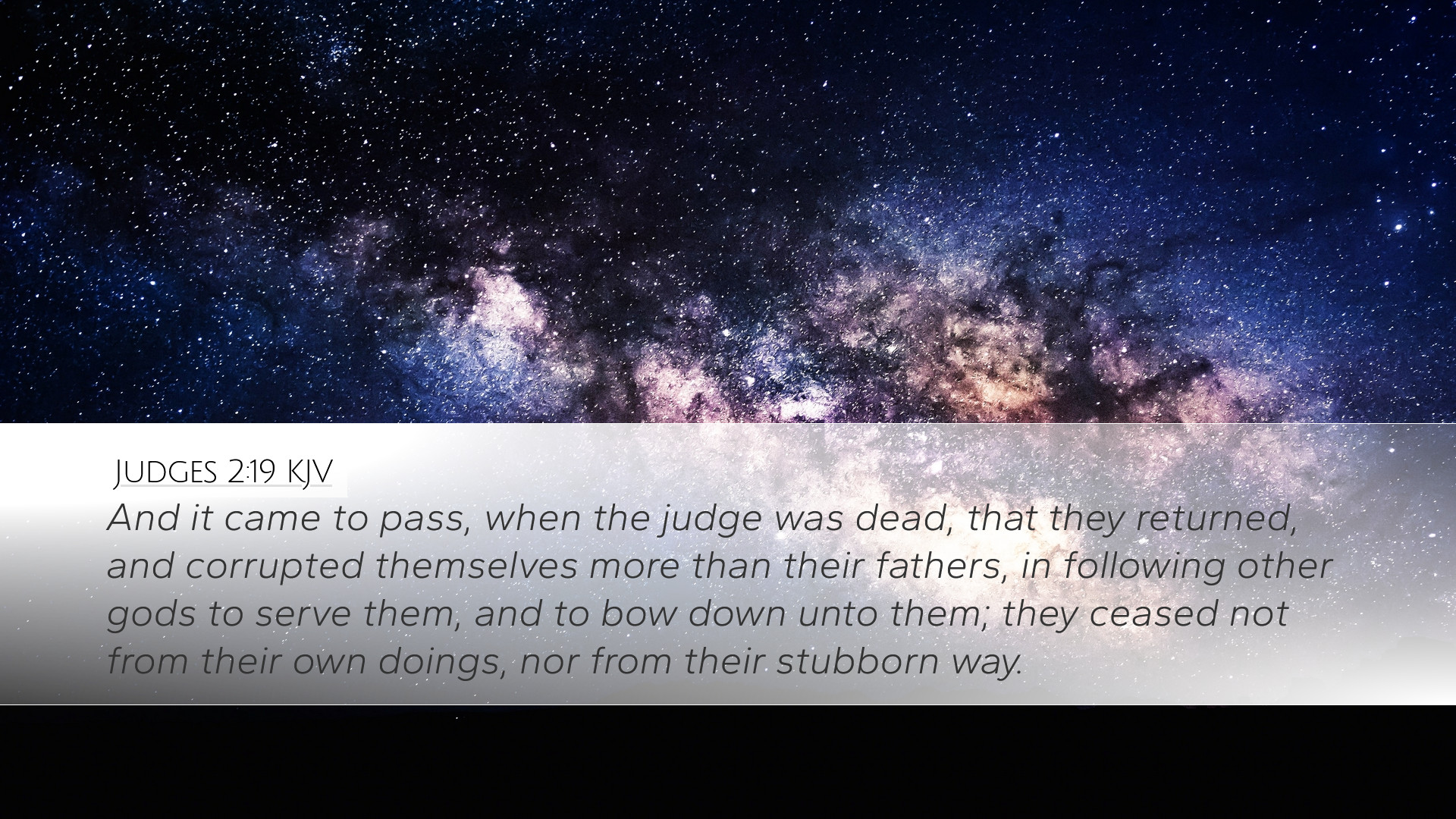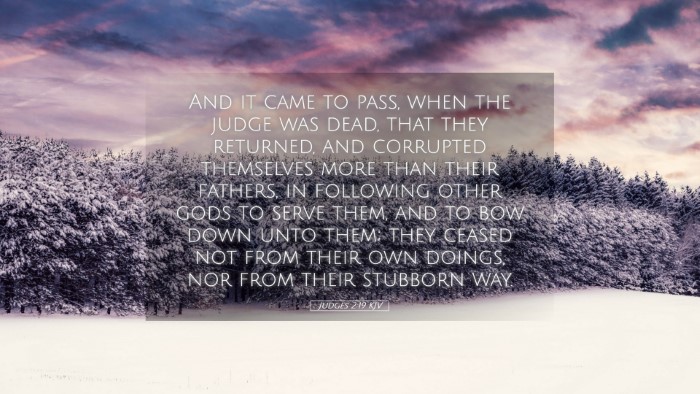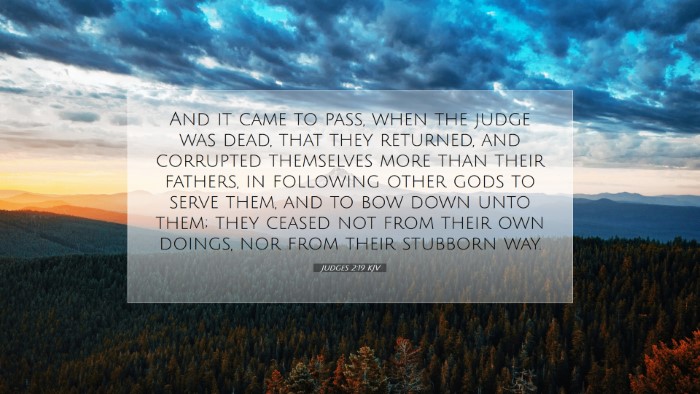Old Testament
Genesis Exodus Leviticus Numbers Deuteronomy Joshua Judges Ruth 1 Samuel 2 Samuel 1 Kings 2 Kings 1 Chronicles 2 Chronicles Ezra Nehemiah Esther Job Psalms Proverbs Ecclesiastes Song of Solomon Isaiah Jeremiah Lamentations Ezekiel Daniel Hosea Joel Amos Obadiah Jonah Micah Nahum Habakkuk Zephaniah Haggai Zechariah MalachiJudges 2:19
Judges 2:19 KJV
And it came to pass, when the judge was dead, that they returned, and corrupted themselves more than their fathers, in following other gods to serve them, and to bow down unto them; they ceased not from their own doings, nor from their stubborn way.
Judges 2:19 Bible Commentary
Commentary on Judges 2:19
This passage from the Book of Judges encapsulates a critical moment in Israel’s history following the death of Joshua. As we examine Judges 2:19, we find profound implications for the spiritual state of Israel and the behavioral patterns that emerge from their covenant relationship with God.
Text of Judges 2:19
“And it came to pass, when the judge was dead, that they returned, and corrupted themselves more than their fathers, in following other gods to serve them, and to bow down unto them: they ceased not from their own doings, nor from their stubborn way.”
Overall Context
The Book of Judges recounts a cycle of sin, oppression, repentance, and deliverance that characterizes Israel's history during the time after Joshua's leadership. This particular verse highlights the inevitability of moral decay that occurs in the absence of strong leadership and spiritual guidance.
Commentary Insights
Matthew Henry's Commentary
Matthew Henry emphasizes the pattern of apostasy that emerges after the judges' death. He notes that the Israelites "returned and corrupted themselves," illustrating the natural tendency towards disobedience when God's appointed leaders are no longer present. Henry draws a distinction between the actions of the people and the faithfulness of God, reminding readers that the failure lies not in divine oversight but in human rebellion.
The phrase "more than their fathers" indicates an escalation in sinfulness, suggesting that the descendants leaped beyond the idolatrous practices of previous generations. This can serve as a sobering reminder to current readers about the spiritual legacy passed down to successive generations.
Albert Barnes' Notes
Albert Barnes offers a detailed exposition on the corruptive influence of idolatry in Israel. He points out that the phrase "they ceased not from their own doings" reflects a stubbornness that was pervasive among the people. This persistence in sin signifies a hardened heart, resistant to repentance and in dire need of spiritual revival.
Barnes elaborates on the consequences of such behavior: the alienation from God that results from following "other gods." He underscores the importance of fidelity to the covenant and warns against the allure of foreign deities, which leads to moral and spiritual decay.
Adam Clarke's Commentary
Adam Clarke provides further analysis on the gravity of Israel's disobedience following the judges' demise. He highlights that the Israelites fell into the trap of idolatry, explaining that their corruption was not merely a lapse in judgment but a deliberate choice to forsake the worship of Yahweh for false gods.
Clarke stresses the importance of leadership in guiding the people towards righteousness. He posits that the lack of a guiding figure—as exemplified by the death of the judge—led to an increase in their sinful actions. The text implies a need for effective spiritual leadership to maintain a culture of faithfulness among the people.
Theological Implications
Judges 2:19 reveals significant theological themes relevant to pastors, theologians, and scholars:
- The Importance of Leadership: The decline in moral standards post-leadership highlights the crucial nature of Godly leadership in maintaining a faithful community.
- Aspatial Nature of Apostasy: The warning against returning to past sins serves as a powerful reminder of humanity's proclivity towards spiritual complacency.
- Generational Influence: This passage raises questions concerning the responsibility of one generation to lead another in faith.
Practical Insights for Ministry
For contemporary application, Judges 2:19 carries lessons for church leaders and members today:
- Commitment to Discipleship: Encouraging a culture of discipleship can foster a deeper relationship with God, mitigating the risk of apostasy.
- Intercession and Prayer: Leaders must prioritize prayer for their communities, asking God for wisdom and strength to resist the temptations that lead to corruption.
- Generational Responsibility: Churches must be mindful of the ways they pass down faith—intentional strategies to engage youth can impact future generations.
Conclusion
In summary, Judges 2:19 serves as a warning against the dangers of spiritual neglect and the susceptibility of human nature to stray from God. It calls for vigilance in leadership, commitment to covenant faithfulness, and a proactive approach in nurturing the next generation in the ways of the Lord.


